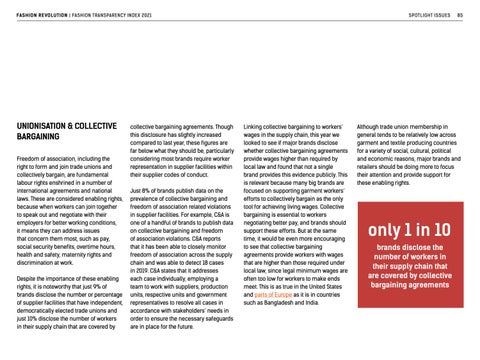FASHION REVOLUTION | FASHION TRANSPARENCY INDEX 2021
UNIONISATION & COLLECTIVE BARGAINING Freedom of association, including the right to form and join trade unions and collectively bargain, are fundamental labour rights enshrined in a number of international agreements and national laws. These are considered enabling rights, because when workers can join together to speak out and negotiate with their employers for better working conditions, it means they can address issues that concern them most, such as pay, social security benefits, overtime hours, health and safety, maternity rights and discrimination at work. Despite the importance of these enabling rights, it is noteworthy that just 9% of brands disclose the number or percentage of supplier facilities that have independent, democratically elected trade unions and just 10% disclose the number of workers in their supply chain that are covered by
collective bargaining agreements. Though this disclosure has slightly increased compared to last year, these figures are far below what they should be, particularly considering most brands require worker representation in supplier facilities within their supplier codes of conduct. Just 8% of brands publish data on the prevalence of collective bargaining and freedom of association related violations in supplier facilities. For example, C&A is one of a handful of brands to publish data on collective bargaining and freedom of association violations. C&A reports that it has been able to closely monitor freedom of association across the supply chain and was able to detect 18 cases in 2019. C&A states that it addresses each case individually, employing a team to work with suppliers, production units, respective units and government representatives to resolve all cases in accordance with stakeholders’ needs in order to ensure the necessary safeguards are in place for the future.
SPOTLIGHT ISSUES
Linking collective bargaining to workers’ wages in the supply chain, this year we looked to see if major brands disclose whether collective bargaining agreements provide wages higher than required by local law and found that not a single brand provides this evidence publicly. This is relevant because many big brands are focused on supporting garment workers’ efforts to collectively bargain as the only tool for achieving living wages. Collective bargaining is essential to workers negotiating better pay, and brands should support these efforts. But at the same time, it would be even more encouraging to see that collective bargaining agreements provide workers with wages that are higher than those required under local law, since legal minimum wages are often too low for workers to make ends meet. This is as true in the United States and parts of Europe as it is in countries such as Bangladesh and India.
85
Although trade union membership in general tends to be relatively low across garment and textile producing countries for a variety of social, cultural, political and economic reasons, major brands and retailers should be doing more to focus their attention and provide support for these enabling rights.
only 1 in 10 brands disclose the number of workers in their supply chain that are covered by collective bargaining agreements

